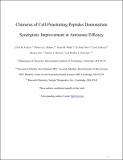| dc.contributor.author | Fadzen, Colin M. | |
| dc.contributor.author | Holden, Rebecca Lynn | |
| dc.contributor.author | Wolfe, Justin | |
| dc.contributor.author | Choo, Zi-Ning | |
| dc.contributor.author | Schissel, Carly K. | |
| dc.contributor.author | Yao, Monica | |
| dc.contributor.author | Hanson, Gunnar J. | |
| dc.contributor.author | Pentelute, Bradley L. | |
| dc.date.accessioned | 2020-10-15T17:04:23Z | |
| dc.date.available | 2020-10-15T17:04:23Z | |
| dc.date.issued | 2019-08 | |
| dc.date.submitted | 2019-08 | |
| dc.identifier.issn | 0006-2960 | |
| dc.identifier.issn | 1520-4995 | |
| dc.identifier.uri | https://hdl.handle.net/1721.1/128007 | |
| dc.description.abstract | Phosphorodiamidate morpholino oligonucleotides (PMOs) make up a promising class of therapeutics for genetic disease. PMOs designed for "exon skipping" must be internalized into cells, reach the nucleus, and act on pre-mRNA to mediate their effects. One tactic for improving PMO delivery and exon skipping is to covalently conjugate PMOs to cell-penetrating peptides (CPPs). Here, we report the synthesis of PMOs conjugated to CPP chimeras, constructed by combining multiple CPPs into one sequence. The chimeric CPPs synergistically improve PMO activity up to 70-fold compared to that of the PMO alone and beyond the expected effects of each component peptide. By investigating the design space of CPP chimeras, we demonstrate that all components must be covalently attached, that the order of the two sequences matters, and that peptide identity can tune activity. We identified one chimera (pVEC-Bpep) to investigate in more detail and found that it engages mechanisms of endocytosis different from those of its parent peptides. We also examined the extent to which the beneficial effect comes from improved cellular uptake as opposed to the downstream steps required for exon skipping. Given the complexity of intracellular delivery, we anticipate this work will lead researchers to consider combining molecules with different physicochemical properties to aid in the delivery of biologic cargoes. | en_US |
| dc.description.sponsorship | National Institutes of Health (Award F30HD093358) | en_US |
| dc.language.iso | en | |
| dc.publisher | American Chemical Society (ACS) | en_US |
| dc.relation.isversionof | http://dx.doi.org/10.1021/acs.biochem.9b00413 | en_US |
| dc.rights | Article is made available in accordance with the publisher's policy and may be subject to US copyright law. Please refer to the publisher's site for terms of use. | en_US |
| dc.source | Prof. Pentelute via Ye Li | en_US |
| dc.title | Chimeras of Cell-Penetrating Peptides Demonstrate Synergistic Improvement in Antisense Efficacy | en_US |
| dc.type | Article | en_US |
| dc.identifier.citation | Fadzen, Colin M. et al. "Chimeras of Cell-Penetrating Peptides Demonstrate Synergistic Improvement in Antisense Efficacy." Biochemistry 58, 38 (August 2019): 3980–3989 © 2019 American Chemical Society | en_US |
| dc.contributor.department | Massachusetts Institute of Technology. Center for Environmental Health Sciences | en_US |
| dc.contributor.department | Massachusetts Institute of Technology. Department of Chemistry | en_US |
| dc.contributor.department | Koch Institute for Integrative Cancer Research at MIT | en_US |
| dc.relation.journal | Biochemistry | en_US |
| dc.eprint.version | Author's final manuscript | en_US |
| dc.type.uri | http://purl.org/eprint/type/JournalArticle | en_US |
| eprint.status | http://purl.org/eprint/status/PeerReviewed | en_US |
| dc.date.updated | 2020-10-06T17:04:58Z | |
| dspace.orderedauthors | Fadzen, CM; Holden, RL; Wolfe, JM; Choo, Z-N; Schissel, CK; Yao, M; Hanson, GJ; Pentelute, BL | en_US |
| dspace.date.submission | 2020-10-06T17:05:05Z | |
| mit.journal.volume | 58 | en_US |
| mit.journal.issue | 38 | en_US |
| mit.license | PUBLISHER_POLICY | |
| mit.metadata.status | Complete | |
